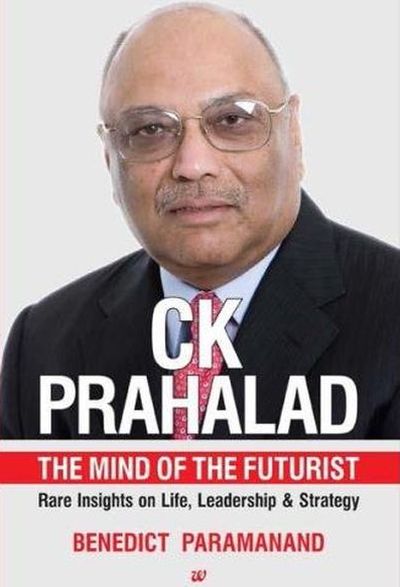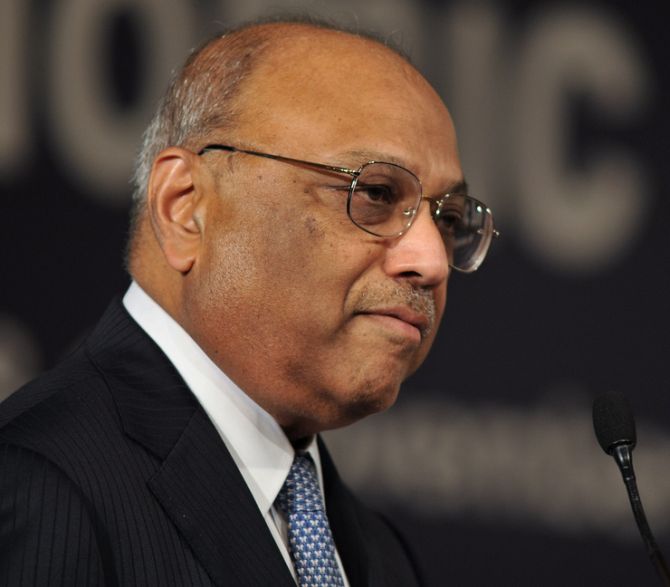
Many give us knowledge, some inspire us but very few spur us to dream. The late Professor C.K. Prahalad not only made Indian business leaders dream big but also helped to achieve them.
A new book on the late Professor C.K. Prahalad tells the story about a simple boy who studied in a Tamil-medium school transformed the mindsets of frightened Indian business leaders after 1991 reforms and turned them into formidable global players.
Here’s an excerpt from the book C.K. Prahalad: The Mind of the Futurist Rare Insights on Life, Leadership & Strategy by Benedict Paramanand. Please …

At a time when ‘leadership’ has become the most talked and written about subject with newer concepts and varieties, CK’s version will remain fresh for a long time and puts immense responsibility on leaders.
CK said: “Leaders must lead. You cannot lead unless you are future oriented; leadership is about the future; it’s about the point of view of the future, and it’s about hope. The first thing is we must have a distinct point of view, not about our current affairs, but how the world can be ten years from now. That is the first principle of a good leader.”
CK deliberately taunted global leaders when he said: “I am arguing strategy and leadership is not extrapolating the current situation to the future but imagining the future and folding that future in.”
In his long career at Citibank, Jerry Rao attended several executive education programmes but he remembers CK’s as the most powerful.
“CK’s was the most participative, least preachy and the one that provided the most challenging strategic content, not just focused on process.”
Then what credit should CK get for the spectacular success of Indian business in the last 25 years? Jerry feels catalysts’ impact are always very difficult to measure. “There’s so much statistical white noise. The fact that all these guys together got it means something, doesn’t it?”
Please …

Executive education has matured and is in the reinvention stage in the US and UK but is relatively a recent phenomenon in India. Its potential is largely unexplored. CK was committed to making Michigan a global leader in it. He built much of RossSchool’s executive or management development effort across the world and used his network in India to the maximum.
The Tatas, Mahindras, Godrej, ICICI Bank, TVS and a few other groups used RossSchool professors to train their senior executives initially in Michigan and later on their campus. Jerry, like CK, is a Loyola College Chennai, and IIM Ahmedabad alumnus. He is today one of India’s star serial entrepreneurs.
After selling his BPO company MphasiS to HP, he now runs Value and Budget Housing Corporation - a bottom of the pyramid concept with the ambition of building one million budget homes in a decade.
CK gave Jerry a “hard time” for not using his original name Jaithirth, which he said was such a nice name, instead of an Americanised Jerry. Jerry remembers, even after a decade, what CK told him about strategy - that strategic planning does not require it to be very complicated. That it was common sense most of the time and companies waste too much time and money and effort on the obvious.
CK was not known for being kind with the confused. “He used to repeatedly tell us that - If you can’t be a low cost producer; you go, do something else. If you are not sure of risks then don’t be in business, it’s not a monastery.”
Please …

CK talked about the importance of what signals organisations gave to talent as more important than a written down code - If we want talented people to work on a project the signal you send has to be that if you work there you get promoted faster.
But if they see that only finance guys get promoted, you will see that in two years or so good talent in project management will disappear - “You have to give the right signal to talented people. If you want to attract them give them real career breaks then automatically talent will come.”
CK scoffed at Indian businesses if they asked for a discount in his fees for workshops or talks. He would tell them that if they could pay big money to American consulting firms, how could they make a fuss to pay him?
He would tell them bluntly; “I may kill myself and do more. I am trying to get you to the top where you can compete with the rest of the world, accept it or don’t, but these are my rates.”
Partners’ Program
The Partners’ Program was CK’s master stroke. M S Krishnan, faculty member at the RossSchool and CK’s right hand man in this venture and co-author, says CK used to constantly innovate in the delivery of the programme.
For example, CK recognised the fact that senior executives were spending 2-3 weeks away from their families and to make them comfortable he launched the ‘Partners Program’. Playing on the spouses’ pride factor, he ensured that the same faculty taught at both programmes but the wives’ ones were shorter.
CK joked saying spouses needed only two days, not two weeks to learn because they had less to forget.
Please …

CK saw executives as humans first and employees next. Although he personally didn’t believe in work-life balance, he understood that managers led stressful lives and it’s important that learning centres maintained a relationship with the family.
Gayatri Prahalad often helped with the partner programme. CK almost made the executive programmes a family affair, which appealed to executives. At a breakfast meeting in 2004, CK invited MS Krishnan to serve as the Faculty Director for executive programmes in India.
Krishnan remembers CK telling him in a no-nonsensical tone; “That this is not a transactional relationship; this is not about how many programmes we do; or think in terms of what is the impact you are going to create. This has to be a transformational experience for you and the way we take Michigan to India and how you impact the companies in India.”
If annual CEO Forums were CK’s nurseries where he groomed Indian business leaders to blossom into global players, in Executive Education workshops he turned managers into confident generals.
Please …

CK’s 11 Commandments for
Responsible Managers
1. Understand the importance of nonconformity. Leadership is about change, hope, and the future. Leaders have to venture into uncharted territory, so they must be able to handle intellectual solitude and ambiguity.
2. Display a commitment to learning and developing yourself. Leaders must invest in themselves. If you aren’t educated, you can’t help the uneducated; if you are sick, you can’t minister to the sick; if you are poor, you can’t help the poor.
3. Develop the ability to put personal performance in perspective. Over a long career, you will experience both success and failure. Humility in success and courage in failure are hallmarks of a good leader.
4. Be ready to invest in developing other people. Be unstinting in helping your colleagues realize their full potential.
5. Learn to relate to those who are less fortunate. Good leaders are inclusive, even though that isn’t easy. Most societies have dealt with differences by avoiding or eliminating them; few assimilate those who aren’t like them.
6. Be concerned about due process. People seek fairness - not favours. They want to be heard. They often don’t even mind if decisions don’t go their way as long as the process is fair and transparent.
7. Realise the importance of loyalty to organization, profession, 46 Teacher’s Teacher community, society, and above all, family. Most of our achievements would be impossible without our families’ support.
8. Assume responsibility for outcomes as well as for the process and people you work with. How you achieve results will shape the kind of person you become.
9. Remember that you are part of a privileged few. That’s your strength, but it’s also a cross you carry. Balance achievement with compassion and learning with understanding.
10. Expect to be judged by what you do and how well you do it – not by what you say you want to do. However, the bias toward action must be balanced by empathy and caring for other people.
11. Be conscious of the part you play. Be concerned about the problems of the poor and disabled, accept human weaknesses, laugh at yourself – and avoid the temptation to play God. Leadership is about self-awareness, recognizing your failings, and developing modesty, humility, and humanity.
Excerpt from CK Prahalad’s article in Harvard Business Review Jan-Feb 2010 titled ‘Responsible Manager’. Please click HERE to buy the book